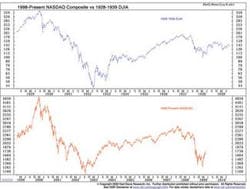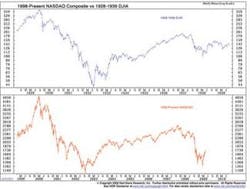Thriving in economic winter
by Brian Hufford, CPA, CFP
For more on this topic, go to www.dentaleconomics.com and search using the following key words: secular market trends, generation of investing, Michael Alexander, Brian Hufford.
Just as there are four seasons in each year, author Michael Alexander, PhD, believes there are four seasons in a 72-year generation of investing. These seasons are called secular market trends. Each lasts from 16 to 20 years, alternating between upward and downward trends. Each new investment generation begins with an upward spring secular trend and ends with a long winter downward trend. The last thing that any retirement saver wants is to experience Michigan in January in attire appropriate for Florida in July.
Alexander announced the arrival of the economic winter secular season in January 2000, in his book, “Stock Cycles: Why Stocks Won't Beat Money Markets Over the Next 20 Years.” While I am skeptical about market cycles or the ability of anyone to forecast market trends, I must admit the accompanying chart is interesting. This chart, printed with permission from Ned Davis Research, compares the Dow Industrials from 1928 to 1939 with the NASDAQ Composite Index from 1998 to 2009. The chart adds credence to Alexander's contention that secular market trends exist.
As similar as the two waves in the chart are, an investor can never expect one period of history to repeat another. Alexander believes that an economic winter period that lasts from 16 to 20 years could exhibit three to five major bottoms within the longer term secular trend.
If indeed this secular cycle began in 2000, we have already experienced two major bottoms — in 2002 and 2008. The last economic winter from 1929 to 1949 was accompanied by major multiyear market rallies, as well as significant declines. Overall, the Dow Industrials fell by approximately 59% from the peak in 1929 to the low in 1949 — 20 years later — while exhibiting several major rallies.
What can a retiree or retirement saver do to thrive in winter? In Indiana, there are two essentials for January: a warm overcoat and a four-wheel drive, and put the Tommy Bahama in storage. You should plan to save substantially more for retirement than normal. We recommend that dentists save a minimum of 20% of income. This is impossible for most dentists without the ability to deduct savings through the qualified retirement plan environment.
Fortunately, current tax rules for most private practice dentists allow deductible savings that are well beyond most dentists' ability to save, even in a deductible environment. Many dentists can deduct $150,000 or more in a paired plan environment, with the correct plan design. Unfortunately, higher retirement savings are needed in the current environment.
A passive buy-and-hold portfolio may be inappropriate dress for the season. Blending a portfolio of index funds, which works well in economic spring, may not work in economic winter. After conducting extensive research of retirement success during long periods of time in the past 100 years, we have found that secular bear markets can make retirement nearly impossible with a passive strategy.
Currently, yields on cash investments are too low to afford the ability to retire while bonds and stocks present challenging risks of their own. While no active investment strategy can guarantee success, the alternative of passive investing seems ill-suited to the times. The wise principles of diversifying asset classes and subasset classes in a passive portfolio are no hiding place when everything is down.
It's time for you to dress appropriately for the season. We have been through the first eight years of a chilly winter, and Groundhog Day may still be weeks ahead. Stay warm and keep your attitude sunny. This too will pass.
Brian Hufford, CPA, CFP®, is CEO of Hufford Financial Advisors, LLC, an independent, fee-only planning firm that helps dentists achieve financial peace of mind. Contact Hufford at (888) 470-3064, or [email protected].

